Caritas in Veritate in re sociali. 37th Meeting of the General Secretaries of the Bishops’ Conferences of Europe - Lviv, Ukraine
Tuesday, 14 July 2009, 13:18 The General Secretaries of the Bishops’ Conferences of Europe held their meeting at the Redemptorist Centre of Bryuchovychi near Lviv (Ukraine), from 9th to 13th July 2009. Twenty-seven countries were represented: Albania, Austria, Belarus, Croatia, France, Germany, England and Wales, Ireland, Italy, Lithuania, Luxembourg, Malta, the Netherlands, Poland, Portugal, the Czech Republic, Romania, Russia, Saints Cyril and Methodius (International Bishops’ Conference), Scotland, Slovenia, Spain, Switzerland, Turkey, Hungary, Ukraine (Byzantine) and Ukraine (Latin). This annual meeting was promoted by the Council of Bishops’ Conferences of Europe (CCEE) and was hosted here following a joint invitation by the Ukrainian Bishops’ Conference (Latin rite) and the Synod of Bishops of the Greek Catholic Church (Byzantine rite). The Apostolic Nuncio Mgr Ivan Jurkovic also attended.
The General Secretaries of the Bishops’ Conferences of Europe held their meeting at the Redemptorist Centre of Bryuchovychi near Lviv (Ukraine), from 9th to 13th July 2009. Twenty-seven countries were represented: Albania, Austria, Belarus, Croatia, France, Germany, England and Wales, Ireland, Italy, Lithuania, Luxembourg, Malta, the Netherlands, Poland, Portugal, the Czech Republic, Romania, Russia, Saints Cyril and Methodius (International Bishops’ Conference), Scotland, Slovenia, Spain, Switzerland, Turkey, Hungary, Ukraine (Byzantine) and Ukraine (Latin). This annual meeting was promoted by the Council of Bishops’ Conferences of Europe (CCEE) and was hosted here following a joint invitation by the Ukrainian Bishops’ Conference (Latin rite) and the Synod of Bishops of the Greek Catholic Church (Byzantine rite). The Apostolic Nuncio Mgr Ivan Jurkovic also attended.
The Catholic Church in Ukraine
The proceedings began with a presentation of the Catholic Church in Ukraine. Episcopal collegiality here is expressed through two institutions, both members of CCEE: the Ukrainian Bishops’ Conference (for Latin rite Bishops), and the Synod of Greek-Catholic Bishops of Ukraine (for the Byzantine rite Hierarchy). Tradition attributes early predication to the Apostle Andrew, who travelled to this region and preached to the Sciti tribes who inhabited this region. It is well know that in the 9th century Saints Cyril and Methodius were active in their proclamation of the Gospel in the Crimea region. The union of the Byzantine Church with the Catholic Church of Rome goes back to 1595-1596 with what is known as the Union of Brest. Through the witness of the highest representatives of the institutions, Cardinal Lubomyr Husar (Greek-Catholic Church) and the Metropolitan Archbishop Mieczysław Morkrzycki (Latin rite Church), the Secretaries were informed as to the many actions underway witnessing the rebirth of Christianity and particularly of the Catholic Church in Ukraine after the dark and “quiet” years under the communist regime which saw the deportation of priests, religious and lay people and the martyrdom of many of them who refused to give up their faith. Despite all attempts to starve, repress and close down the structures of the Greek-Catholic Church, the faith of Ukrainians lives survived. Today, as the Church is actively rebuilding Herself (both in ecclesial fabric and for what concerns places of worship and formation – as confiscated property has not all been returned), new challenges are on the horizon, especially linked to migration phenomena, and they require a new response, and one which is in synergy with the other Catholic Churches on the continent. The priest: his life and his mission
The General Secretaries welcomed the proclamation of a Year of the Priest on the part of Pope Benedict XVI as a privileged opportunity for the Church to especially focus on the vocation, life, spirituality and ministry of priests. Through a series of contributions on these various aspects of the ministry of priests, attendees pointed out their specific ambits and problems a priest is called to face today. After a brief presentation of the activities of the European Vocations Service (EVS), the “Vocations” Commission of CCEE, through Fr Ferenc Janka, CCEE Vice-General Secretary, underlined the need to explicitly reflect on the vocation of priests at a European level. “It is essential – Fr Janka said – that priests transmit the Word which explicitly calls to the priesthood with courage”. For Father Manuel Morujão sj, Secretary of the Bishops’ Conference of Portugal, “A priest is a noun, and not an adjective,” and “the definition of a priest is not the function or the task he performs”. This priesthood is not “personal self-management”, nor a job, nor a profession or a craft, but a vocation and mission that come from Christ through His Church. A priest is a “human being who specialises in God” in order to serve men and women twenty-four hours a day – an expert in the art of encountering God. This is why he is called to be an authentic seeker of God and to draw on the Eucharist as his highest expression of fulfilment. For Fr Paul Conroy, the General Secretary of the Scottish Bishops’ Conference, often we speak of a crisis of vocations, of the priesthood and of faith, but we should also remember that there is a crisis in all of Western society. And perhaps this crisis is the one having the greatest impact on others. Father Conroy goes on to say that the decline of vocations to the priesthood can be traced back to the crisis of families, who are no longer the place where vocations grow and ripen. A possible answer to the problem should then be looked for in the “life witness offered by priests themselves”. For Mgr Vjekoslav Huzjak, General Secretary of the Bishops’ Conference of Croatia, the priestly communion draws its life and model from the Trinity. As in a relation of Trinity, a priest is called to relate firstly in the communion with his Bishop, with his brother-priests, and finally with the community. A priest is in fact a “collaborator of the Bishop, and not a freelancer”. In these times in which our society appears splintered, and does not display many unifying traits, values and witness, there is the temptation to think that also “work and effort for communion seem perhaps more greatly out of place as they do not pay and because they do not immediately produce measurable results in terms of quantity”. Whereas, according to Mgr Huzjak, one of the main tasks of a priest is the witness in being a “maker of unity” within the communities entrusted to him. Caritas in Veritate
Fr Hans Langendörfer sj, General Secretary of the German Bishops’ Conference presented the recent Encyclical Letter of Pope Benedict XVI, Veritas in Caritate. The Jesuit Father underlined three priorities contained on this new document: the central role of man, the social dimension of the economy, the theme of globalisation and the interdependence of Policentres. Though not new to the social teachings of the Church, it is significant that the Holy Father has decided to reiterate the central role of man as the social-economic and cultural context has greatly changed in these years. “The world of economics and politics likes to talk about technology, of how to save the banks and of how to preserve certain sectors of the economy, – said Fr Langendörfer – and though these questions may be legitimate, the underlying question must still be: “Why all this?” For the Holy Father, the answer is simple: the main engine must be the search for the common good and the integral development of the human person. The economy and the market need ethics in order to function correctly, an ethics which is people-friendly. In this sense the Christian religion can certainly contribute to the development of peoples, on condition that a space for God is left in the public sphere. The social dimension of the economy that the Pope defines is one which dies not tolerate exclusion or waste. Every man has a right to be a part of the market and of the world of employment. And this is particularly important in these times, as we reassess the “public powers of the State” (24). Therefore a State is called for which must be open to a greater participation of civil society. Firstly, with Trade Unions, as Fr Langendöfer underlines, particularly for the safeguard of issues pertaining to social and professional security, but also in other specific ambits, such as the Church. Due to the economic and financial crisis, we have understood that the market cannot count on itself, but “must draw moral energies from other subjects”, because the social issue of the economy, and of a development ruled by “technology”, becomes also an anthropological one. The development of peoples cannot be disconnected from respect for life, religious freedom, and the safeguard of the rights of workers... The third priority highlighted by Fr Langendörfer is that of the development of a globalised and poly-centric world. “An ever increasingly globalised society brings us closer – states the Pope – but does not make us brothers” (19). The Pontiff himself clearly recalls how development today is polycentric, and how the causes for lack of development are not mainly material in nature, but are caused by wills and thought, as well as to the lack of fraternity among men (cfr.19). The Encyclical Letter highlights the necessity to re-think development in global and interdependent terms. Specifically, economic reconstruction must not involve developed countries alone. The European economy cannot ignore Africa or Asia. On the contrary, globalisation must become an integration tool for poorer countries. A personalist and communitarian approach to globalisation is needed, and one open to the transcendent. In the discussion that followed, the Secretaries expressed their appreciation for this document, which they defined as an” Encyclical of social theology”, and for the clarity with which the Holy Father was able to single out current day needs and at the same time to reiterate the central message of the social teaching of the Church: the central role of man. He achieves this in a way which is free, and with an attitude open to deeper analysis. The Pope does not express hurried judgement but carries out a true assessment of evils and risks of an uncontrolled economic development. We need to remember how this Encyclical Letter was written not only for developed countries, but is aimed at all man and women and peoples. Nor is it merely a collection of technical solutions, but rather the expression of a “mission of truth to be accomplished”(9). With this document, the General Secretaries appreciated the attempt of the Church to organise Her thoughts and open a debate on the theme of social development, which is one of social love. With this optimistic but realistic Encyclical, the Pope has had the courage to call to conversion the development and the way of thinking of men. Now the document is entrusted to all Christians and particularly to the Bishops’ Conferences of Europe and the world so a reflection at a local level may take place. Topical themes: euthanasia, Church and media, 2011 WYD
A range of events wounding the dignity of the human person are taking place across Europe, and they are of concern to the Church due to the anthropological model they promote, as this is distant from the culture of life and from the natural model of the family. Specifically, attendees were informed of the case of Eluana Englaro, which has brought intense debate on euthanasia in Italy. Another case brought to attention of the Secretaries is that of English Catholic Agencies who are compelled to proceed in adoption applications also for same-sex couples. Refusal has brought to closure in cases. The meeting was also the opportunity to discuss the relations between Church and the media. The Church feels an increasingly urgent need to manage relations with the media in the knowledge that a growth in expertise is needed in an environment which can be hostile. Finally, participants were briefed on the next World Youth Day in Madrid (2011). The service of CCEE and of COMECE
The General Secretaries of the Bishops’ Conference of Europe were informed about the actions taking place in 2010 for CCEE and its various Commissions. From his part, the General Secretary of COMECE, Don Piotr Mazurkiewicz, commented on the results of the recent European parliamentary elections. The Church in Europe supports and accompanies with attention a process of European unification, bringing development and peace but also serious questions on presumed values which so far some representatives of the EU have tired to put forward in individual countries through European legislation, particularly in the field of education, the role of religion, life and the family. This may represent a risk for the very vision of the human person. The days of the meeting also featured times for prayer and Eucharistic celebrations with the local community: on Friday 10 July at the Latin Church of the Assumption, and on Sunday 12 July with Divine Liturgy at the Greek-Catholic Cathedral of St George. As they found themselves together on the day of St Benedict, Patron Saint of Europe, the Secretaries prayed for Europe and signed and sent a letter of greeting and thanks to Pope Benedict XVI for his Encyclical and for his “Papal name day”. Finally, in the afternoon of Sunday 12 July, the delegates met with the Mayor of Lviv. The 2010 meeting will take place in Rome from 10 to 13 June. The Council of the Bishops’ Conferences of Europe (CCEE) gathers the Presidents of the current 33 European Bishops’ Conferences of this Continent, represented by their Presidents, and the Archbishops of Luxembourg and of the Principality of Monaco, as well as the Bishop of Chişinău (Moldavia). The President is Cardinal Péter Erdő, Archbishop of Esztergom-Budapest, Primate of Hungary; the Vice-Presidents are Cardinal Josip Bosanić, Archbishop of Zagreb, and Cardinal Jean-Pierre Ricard, Archbishop of Bordeaux. The CCEE General Secretary is Fr Duarte da Cunha. The headquarters of the Secretariat is in St. Gallen (Switzerland).
The proceedings began with a presentation of the Catholic Church in Ukraine. Episcopal collegiality here is expressed through two institutions, both members of CCEE: the Ukrainian Bishops’ Conference (for Latin rite Bishops), and the Synod of Greek-Catholic Bishops of Ukraine (for the Byzantine rite Hierarchy). Tradition attributes early predication to the Apostle Andrew, who travelled to this region and preached to the Sciti tribes who inhabited this region. It is well know that in the 9th century Saints Cyril and Methodius were active in their proclamation of the Gospel in the Crimea region. The union of the Byzantine Church with the Catholic Church of Rome goes back to 1595-1596 with what is known as the Union of Brest. Through the witness of the highest representatives of the institutions, Cardinal Lubomyr Husar (Greek-Catholic Church) and the Metropolitan Archbishop Mieczysław Morkrzycki (Latin rite Church), the Secretaries were informed as to the many actions underway witnessing the rebirth of Christianity and particularly of the Catholic Church in Ukraine after the dark and “quiet” years under the communist regime which saw the deportation of priests, religious and lay people and the martyrdom of many of them who refused to give up their faith. Despite all attempts to starve, repress and close down the structures of the Greek-Catholic Church, the faith of Ukrainians lives survived. Today, as the Church is actively rebuilding Herself (both in ecclesial fabric and for what concerns places of worship and formation – as confiscated property has not all been returned), new challenges are on the horizon, especially linked to migration phenomena, and they require a new response, and one which is in synergy with the other Catholic Churches on the continent. The priest: his life and his mission
The General Secretaries welcomed the proclamation of a Year of the Priest on the part of Pope Benedict XVI as a privileged opportunity for the Church to especially focus on the vocation, life, spirituality and ministry of priests. Through a series of contributions on these various aspects of the ministry of priests, attendees pointed out their specific ambits and problems a priest is called to face today. After a brief presentation of the activities of the European Vocations Service (EVS), the “Vocations” Commission of CCEE, through Fr Ferenc Janka, CCEE Vice-General Secretary, underlined the need to explicitly reflect on the vocation of priests at a European level. “It is essential – Fr Janka said – that priests transmit the Word which explicitly calls to the priesthood with courage”. For Father Manuel Morujão sj, Secretary of the Bishops’ Conference of Portugal, “A priest is a noun, and not an adjective,” and “the definition of a priest is not the function or the task he performs”. This priesthood is not “personal self-management”, nor a job, nor a profession or a craft, but a vocation and mission that come from Christ through His Church. A priest is a “human being who specialises in God” in order to serve men and women twenty-four hours a day – an expert in the art of encountering God. This is why he is called to be an authentic seeker of God and to draw on the Eucharist as his highest expression of fulfilment. For Fr Paul Conroy, the General Secretary of the Scottish Bishops’ Conference, often we speak of a crisis of vocations, of the priesthood and of faith, but we should also remember that there is a crisis in all of Western society. And perhaps this crisis is the one having the greatest impact on others. Father Conroy goes on to say that the decline of vocations to the priesthood can be traced back to the crisis of families, who are no longer the place where vocations grow and ripen. A possible answer to the problem should then be looked for in the “life witness offered by priests themselves”. For Mgr Vjekoslav Huzjak, General Secretary of the Bishops’ Conference of Croatia, the priestly communion draws its life and model from the Trinity. As in a relation of Trinity, a priest is called to relate firstly in the communion with his Bishop, with his brother-priests, and finally with the community. A priest is in fact a “collaborator of the Bishop, and not a freelancer”. In these times in which our society appears splintered, and does not display many unifying traits, values and witness, there is the temptation to think that also “work and effort for communion seem perhaps more greatly out of place as they do not pay and because they do not immediately produce measurable results in terms of quantity”. Whereas, according to Mgr Huzjak, one of the main tasks of a priest is the witness in being a “maker of unity” within the communities entrusted to him. Caritas in Veritate
Fr Hans Langendörfer sj, General Secretary of the German Bishops’ Conference presented the recent Encyclical Letter of Pope Benedict XVI, Veritas in Caritate. The Jesuit Father underlined three priorities contained on this new document: the central role of man, the social dimension of the economy, the theme of globalisation and the interdependence of Policentres. Though not new to the social teachings of the Church, it is significant that the Holy Father has decided to reiterate the central role of man as the social-economic and cultural context has greatly changed in these years. “The world of economics and politics likes to talk about technology, of how to save the banks and of how to preserve certain sectors of the economy, – said Fr Langendörfer – and though these questions may be legitimate, the underlying question must still be: “Why all this?” For the Holy Father, the answer is simple: the main engine must be the search for the common good and the integral development of the human person. The economy and the market need ethics in order to function correctly, an ethics which is people-friendly. In this sense the Christian religion can certainly contribute to the development of peoples, on condition that a space for God is left in the public sphere. The social dimension of the economy that the Pope defines is one which dies not tolerate exclusion or waste. Every man has a right to be a part of the market and of the world of employment. And this is particularly important in these times, as we reassess the “public powers of the State” (24). Therefore a State is called for which must be open to a greater participation of civil society. Firstly, with Trade Unions, as Fr Langendöfer underlines, particularly for the safeguard of issues pertaining to social and professional security, but also in other specific ambits, such as the Church. Due to the economic and financial crisis, we have understood that the market cannot count on itself, but “must draw moral energies from other subjects”, because the social issue of the economy, and of a development ruled by “technology”, becomes also an anthropological one. The development of peoples cannot be disconnected from respect for life, religious freedom, and the safeguard of the rights of workers... The third priority highlighted by Fr Langendörfer is that of the development of a globalised and poly-centric world. “An ever increasingly globalised society brings us closer – states the Pope – but does not make us brothers” (19). The Pontiff himself clearly recalls how development today is polycentric, and how the causes for lack of development are not mainly material in nature, but are caused by wills and thought, as well as to the lack of fraternity among men (cfr.19). The Encyclical Letter highlights the necessity to re-think development in global and interdependent terms. Specifically, economic reconstruction must not involve developed countries alone. The European economy cannot ignore Africa or Asia. On the contrary, globalisation must become an integration tool for poorer countries. A personalist and communitarian approach to globalisation is needed, and one open to the transcendent. In the discussion that followed, the Secretaries expressed their appreciation for this document, which they defined as an” Encyclical of social theology”, and for the clarity with which the Holy Father was able to single out current day needs and at the same time to reiterate the central message of the social teaching of the Church: the central role of man. He achieves this in a way which is free, and with an attitude open to deeper analysis. The Pope does not express hurried judgement but carries out a true assessment of evils and risks of an uncontrolled economic development. We need to remember how this Encyclical Letter was written not only for developed countries, but is aimed at all man and women and peoples. Nor is it merely a collection of technical solutions, but rather the expression of a “mission of truth to be accomplished”(9). With this document, the General Secretaries appreciated the attempt of the Church to organise Her thoughts and open a debate on the theme of social development, which is one of social love. With this optimistic but realistic Encyclical, the Pope has had the courage to call to conversion the development and the way of thinking of men. Now the document is entrusted to all Christians and particularly to the Bishops’ Conferences of Europe and the world so a reflection at a local level may take place. Topical themes: euthanasia, Church and media, 2011 WYD
A range of events wounding the dignity of the human person are taking place across Europe, and they are of concern to the Church due to the anthropological model they promote, as this is distant from the culture of life and from the natural model of the family. Specifically, attendees were informed of the case of Eluana Englaro, which has brought intense debate on euthanasia in Italy. Another case brought to attention of the Secretaries is that of English Catholic Agencies who are compelled to proceed in adoption applications also for same-sex couples. Refusal has brought to closure in cases. The meeting was also the opportunity to discuss the relations between Church and the media. The Church feels an increasingly urgent need to manage relations with the media in the knowledge that a growth in expertise is needed in an environment which can be hostile. Finally, participants were briefed on the next World Youth Day in Madrid (2011). The service of CCEE and of COMECE
The General Secretaries of the Bishops’ Conference of Europe were informed about the actions taking place in 2010 for CCEE and its various Commissions. From his part, the General Secretary of COMECE, Don Piotr Mazurkiewicz, commented on the results of the recent European parliamentary elections. The Church in Europe supports and accompanies with attention a process of European unification, bringing development and peace but also serious questions on presumed values which so far some representatives of the EU have tired to put forward in individual countries through European legislation, particularly in the field of education, the role of religion, life and the family. This may represent a risk for the very vision of the human person. The days of the meeting also featured times for prayer and Eucharistic celebrations with the local community: on Friday 10 July at the Latin Church of the Assumption, and on Sunday 12 July with Divine Liturgy at the Greek-Catholic Cathedral of St George. As they found themselves together on the day of St Benedict, Patron Saint of Europe, the Secretaries prayed for Europe and signed and sent a letter of greeting and thanks to Pope Benedict XVI for his Encyclical and for his “Papal name day”. Finally, in the afternoon of Sunday 12 July, the delegates met with the Mayor of Lviv. The 2010 meeting will take place in Rome from 10 to 13 June. The Council of the Bishops’ Conferences of Europe (CCEE) gathers the Presidents of the current 33 European Bishops’ Conferences of this Continent, represented by their Presidents, and the Archbishops of Luxembourg and of the Principality of Monaco, as well as the Bishop of Chişinău (Moldavia). The President is Cardinal Péter Erdő, Archbishop of Esztergom-Budapest, Primate of Hungary; the Vice-Presidents are Cardinal Josip Bosanić, Archbishop of Zagreb, and Cardinal Jean-Pierre Ricard, Archbishop of Bordeaux. The CCEE General Secretary is Fr Duarte da Cunha. The headquarters of the Secretariat is in St. Gallen (Switzerland).
http://www.ccee.ch/index.php?&na=4,1,0,0,e,115822,0,0,
LATEST NEWS

We can imagine what the prayer of the prisoners in the Russian torture centers in the Ukrainian Kharkiv region was like – Head of the UGCC on the 206th day of the war 17 September
A vast cemetery, a mass burial, was found near the city of Izyum, in which more than 400 innocently killed and tortured people have already been...
-
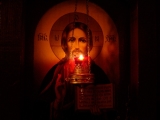 Глава УГКЦ у 158-й день війни: «Нехай Господь прийме з уст нашої Церкви псалми та моління за всіх тих, які особливо просять нашої молитви»
Глава УГКЦ у 158-й день війни: «Нехай Господь прийме з уст нашої Церкви псалми та моління за всіх тих, які особливо просять нашої молитви»
-
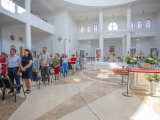 «Сила, яка походить із вірності Христові, є стержнем, який ніхто не може зламати», – Блаженніший Святослав
«Сила, яка походить із вірності Христові, є стержнем, який ніхто не може зламати», – Блаженніший Святослав
-
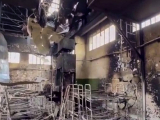 Глава УГКЦ у 157-й день війни: «В ім’я Боже ми засуджуємо звірства в Оленівці і світ повинен це засудити як особливий вияв дикості й жорстокості»
Глава УГКЦ у 157-й день війни: «В ім’я Боже ми засуджуємо звірства в Оленівці і світ повинен це засудити як особливий вияв дикості й жорстокості»
-
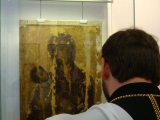 «Боже, почуй наш плач і поспіши нам на допомогу і порятунок!», – Глава УГКЦ у 156-й день війни
«Боже, почуй наш плач і поспіши нам на допомогу і порятунок!», – Глава УГКЦ у 156-й день війни
-
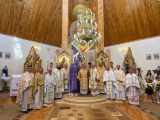 «Бог йому дав серце і душу українського народу»: відбулася щорічна проща до Прилбичів з нагоди уродин митрополита Андрея Шептицького
«Бог йому дав серце і душу українського народу»: відбулася щорічна проща до Прилбичів з нагоди уродин митрополита Андрея Шептицького
-
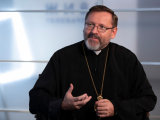 Глава УГКЦ: «Я горджуся українськими патріотами, які без найменшої краплі ненависті готові захищати своє»
Глава УГКЦ: «Я горджуся українськими патріотами, які без найменшої краплі ненависті готові захищати своє»
-
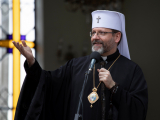 Блаженніший Святослав закликав українську молодь скласти присягу на вірність Христові
Блаженніший Святослав закликав українську молодь скласти присягу на вірність Христові
-
 Глава УГКЦ у 155-й день війни: «Помолімося, щоб не втратити скарбу віри князя Володимира»
Глава УГКЦ у 155-й день війни: «Помолімося, щоб не втратити скарбу віри князя Володимира»
-
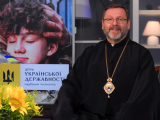 Блаженніший Святослав у День державності України: «Наша Держава – це для нас питання життя або смерті»
Блаженніший Святослав у День державності України: «Наша Держава – це для нас питання життя або смерті»
-
 Глава УГКЦ у 154-й день війни: «Нехай Господь Бог прийме у свої вічні обійми журналістів, які віддали за правду своє життя в Україні»
Глава УГКЦ у 154-й день війни: «Нехай Господь Бог прийме у свої вічні обійми журналістів, які віддали за правду своє життя в Україні»
-
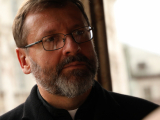 Глава УГКЦ у 153-й день війни: «Принесімо наш біль перед Боже обличчя і будьмо певні, що Він нас вислухає»
Глава УГКЦ у 153-й день війни: «Принесімо наш біль перед Боже обличчя і будьмо певні, що Він нас вислухає»
-
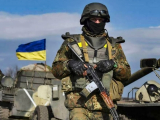 Глава УГКЦ у 152-й день війни: «Помолімся молитву заступництва за наших воїнів»
Глава УГКЦ у 152-й день війни: «Помолімся молитву заступництва за наших воїнів»
-
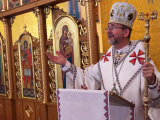 «Віруюча людина не може бути байдужою, коли бачить страждання іншої людини», – владика Богдан Дзюрах
«Віруюча людина не може бути байдужою, коли бачить страждання іншої людини», – владика Богдан Дзюрах
-
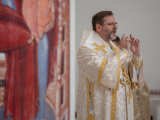 «Серед нашого страждання творімо простір для прояву Божої всемогутності», – Глава УГКЦ у 6-ту неділю після П’ятдесятниці
«Серед нашого страждання творімо простір для прояву Божої всемогутності», – Глава УГКЦ у 6-ту неділю після П’ятдесятниці
-
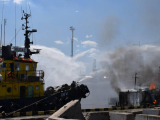 Глава УГКЦ у 151-й день війни: «Російське віроломство ми перемагаємо силою любові до нашої Батьківщини»
Глава УГКЦ у 151-й день війни: «Російське віроломство ми перемагаємо силою любові до нашої Батьківщини»

